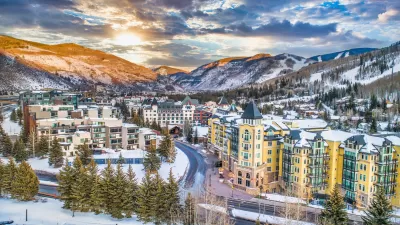Sky-high housing costs are driving workers away from Colorado's mountain towns, leading to labor shortages in some of the state's key industries.

While many locals in Colorado struggle to find affordable housing near their jobs, census data show that 34 to 71 percent of housing across 15 Western Colorado counties is vacant, serving as vacation rentals and second homes for wealthy investors and out-of-towners. As Bruce Finley reports, the vacancy rate, coupled with the influx of new residents seeking homes outside of big cities during the pandemic, has caused housing costs to rise dramatically.
For decades, housing challenges primarily afflicted low-wage tourism and recreation industry employees, compelling resorts to install subsidized apartments designed for single workers. But now, after 20 months of COVID-driven influx, officials find that even the highest-paying jobs such as those in the mining industry, which 150 years ago gave rise to mountain settlement, no longer are sufficient for workers to afford housing.
The cost of housing has led to a labor shortage in the region as fewer workers can afford to live near available jobs. Meanwhile, staffing shortages at public transit agencies mean increased wait times and reduced service for riders.
Towns in the region are looking for ways to ease the burden on residents by restricting short-term rentals and pushing for more new housing. Programs in Winter Park and Breckenridge pay property owners to lease to local residents.
As more workers leave the area, writes Finley, the tourism industry and "the attractions that draw visitors in the first place" themselves will likely suffer.
FULL STORY: Towns in Colorado high country eye ways to ease affordable housing shortage

Alabama: Trump Terminates Settlements for Black Communities Harmed By Raw Sewage
Trump deemed the landmark civil rights agreement “illegal DEI and environmental justice policy.”

Planetizen Federal Action Tracker
A weekly monitor of how Trump’s orders and actions are impacting planners and planning in America.

How Atlanta Built 7,000 Housing Units in 3 Years
The city’s comprehensive, neighborhood-focused housing strategy focuses on identifying properties and land that can be repurposed for housing and encouraging development in underserved neighborhoods.

In Both Crashes and Crime, Public Transportation is Far Safer than Driving
Contrary to popular assumptions, public transportation has far lower crash and crime rates than automobile travel. For safer communities, improve and encourage transit travel.

Report: Zoning Reforms Should Complement Nashville’s Ambitious Transit Plan
Without reform, restrictive zoning codes will limit the impact of the city’s planned transit expansion and could exclude some of the residents who depend on transit the most.

Judge Orders Release of Frozen IRA, IIJA Funding
The decision is a victory for environmental groups who charged that freezing funds for critical infrastructure and disaster response programs caused “real and irreparable harm” to communities.
Urban Design for Planners 1: Software Tools
This six-course series explores essential urban design concepts using open source software and equips planners with the tools they need to participate fully in the urban design process.
Planning for Universal Design
Learn the tools for implementing Universal Design in planning regulations.
Caltrans
Smith Gee Studio
Institute for Housing and Urban Development Studies (IHS)
City of Grandview
Harvard GSD Executive Education
Toledo-Lucas County Plan Commissions
Salt Lake City
NYU Wagner Graduate School of Public Service





























